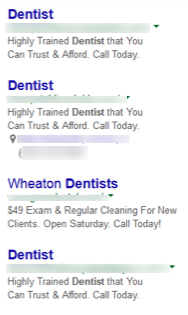2 Mistakes That Cause Advertisers to Quit AdWords Just When They’re on the Verge of a Breakthrough
AdWords isn’t an appropriate advertising medium for every business, but the truth is that many advertisers give up on AdWords way too soon.
AdWords isn’t an appropriate advertising medium for every business, but the truth is that many advertisers give up on AdWords way too soon.
When people find out I’m the author of Google AdWords for Dummies, the second most common reaction, after “What’s AdWords?”, is “Oh, I tried AdWords. It didn’t work for me.”
I’m biased, certainly, and I understand that AdWords isn’t an appropriate advertising medium for every business, but the truth is that many advertisers give up on AdWords way too soon.
In this article, I’ll share the two most common mistakes we see in the AdWords accounts of our new clients who are almost on the verge of throwing in the towel, and how we deal with them.
But first, some context.
There are two fundamental reasons that your AdWords campaigns are failing: AdWords problems and business problems.
In other words, maybe you’re not using AdWords as effectively as your competitors, so they get the best traffic at the best prices, and you’re hustling for paltry scraps at a premium. Or perhaps you’re doing everything right inside your account, but your product or message or business model is not as robust as those of your competitors.
Most cases are a combination of the two. So fixing your AdWords account won’t necessarily open the floodgates of hungry prospects eager to buy what you’re selling (although we’ve seen that often enough).
But solving your AdWords problems will allow you to perform an accurate stress test on your business, so you can identify and overcome your weaknesses relative to your competition.
The business that wins AdWords is the one that can afford to spend the most for a click. The higher you can bid, the more traffic you get. The more traffic you get, the faster you can test and learn and improve.
And the business that can spend the most for a click, in the long term, is the one that monetizes that click most efficiently. Or, to drop the jargon for a moment, the one that makes the most money from that prospect.
If your business converts prospects better and gets them to spend more than do your competitors, you get to win AdWords. So AdWords traffic can represent the perfect “stress test” for your business fundamentals – but only if you get the AdWords part right to begin with.
Here are the three most common AdWords mistakes that lead business owners to give up on the medium before it’s delivered the lead flow – or strategic insight – of which its capable.
The AdWords default settings are all about getting you the most impressions and clicks possible. I’ve never seen a case where opening up all the traffic sluices from the get-go was a good idea.
Rather, indiscriminate use of vague, high-traffic keywords and overly permissive campaign settings waste money by sending you lots of visitors who are not your prospects.
Watch out for three principal money-wasters:
A. Overly generic terms: If you’re a wedding photographer, don’t bid on “photographer” unless you want to branch into photographing kids, pets, pregnant women, mansions, and sporting events.
B. Broad Match keywords: Instead, choose exact and modified broad match to keep Google from throwing too much junk into your AdWords trunk.
C. “Stairway to Heaven” keywords: As in, “words that have two meanings.” Examples include words like “windows,” which can refer to the glass-filled holes in your house, or the operating system, and “speaker,” which can refer to an orator or the thumpingly loud box your neighbor can’t seem to turn down.
Two maintenance activities to eliminate bad traffic:
A. Scour your search queries for keywords that you don’t want to attract and turn them into negatives.
B. Set up conversion tracking and pause or delete keywords that cost you more than they make in profits.
Google cares a lot about your click-through rate (CTR). The better it is, everything else being equal, the less you’ll pay for each click. Think of it as a thank-you discount for buying in bulk.
If your ads look the same as your competitors’ ads, then there’s no particular reason for a prospect to click yours. Sure, you can pay more for a more prominent placement, but you can often achieve the same goal for free by writing an ad that cuts through the clutter on the page.
Here’s a sad example of a “me-too” search results page:

What kind of ad would cut through the clutter? The specific wording would be based, ideally, on the unique and valuable difference of the dental clinic in question. But even without thinking hard, an advertiser might focus on any of the following:
The steps here are simple, although successful execution generally takes time and thought.
In a future article, I’ll share the next three most common mistakes. But getting these two fixed will go a long way toward bringing the right people to your website.